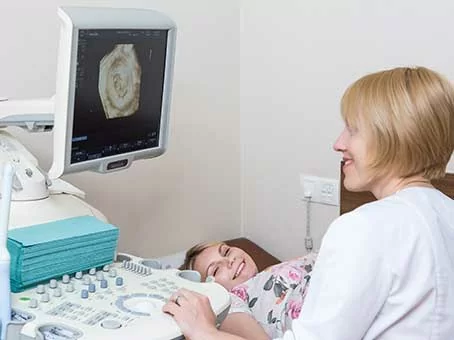
Emotional and Health Risks of Surrogacy: problems of a surrogate mother in the course of reproductive program

Participation in a surrogacy program requires a clear understanding of how the surrogacy process works, what problems a surrogate mother may encounter, what are the risks of surrogacy, and many other important details.
- Risks Associated with Surrogacy
- Health-related complications of surrogacy
- Emotional Risks of Surrogacy
- Legal risks of surrogacy
Understanding the problems of surrogacy is necessary not only for the gestational carrier, but also for the intended parents: the risks associated with surrogacy can have a strong impact on the outcome of the program, and will also be spelled out in the contract, directly affecting the price of the program. This material is devoted to considering the risks of surrogacy, complications in surrogacy, and the emotional side of surrogacy.
Risks Associated with Surrogacy
Any risks that accompany a natural pregnancy and birth may also accompany a gestational carrier's pregnancy. The risks of surrogacy in relation to the reproductive program cycle can be divided into 3 groups:
- Health complications of surrogacy.
- Emotional risks of surrogacy.
- Legal risks of surrogacy.
Each point requires clarification and additional information on ways to minimize the indicated risks.
Health-related complications of surrogacy
This group includes standard risks typical of any pregnancy: from trivial and relatively safe toxicosis to life-threatening placental abruption. Possible individual reactions to hormonal drugs used in preparation for IVF, maintaining embryo implantation and pregnancy development are considered separately. With regard to the IVF procedure itself, there are risks of implantation bleeding, infection, and seizures.
The contract concluded by the intended parents, the gestational carrier and the reproductive clinic must include in detail such risks of surrogacy as:
- several unsuccessful embryo transfers in a row;
- need to terminate pregnancy based on indications from the fetus or mother;
- spontaneous termination of pregnancy;
- removal of the uterus due to a life-threatening condition.
To minimize the above-mentioned problems of the surrogate mother, many measures are taken even before the program begins. The first and most important is the selection of a gestational carrier, whose health condition, based on the results of the examination, together with her own successful pregnancy, allows us to assume high chances of a successful outcome of the program.
If a program involving a surrogate mother and an oocyte donor is planned, a donor with the same Rh factor as the gestational carrier will be selected. This measure eliminates the Rh conflict that threatens the pregnancy. During pregnancy, surrogate mothers visit the doctor more often than during their own pregnancy; they may be prescribed additional support procedures, hormone injections, and other measures that can help them successfully carry the pregnancy. Attentiveness to their condition, trusting contact with the doctor and curator increase the chances of timely monitoring and correction of some of the surrogate mother's health problems.
The listed measures can not prevent 100% of all possible complications. Some dangerous conditions are unpredictable and can develop in a matter of hours ― that is why they are clearly spelled out in the contract. Intended parents can be sure that a good reproductive clinic, as well as a surrogate mother, are also interested in a successful outcome of the program. In the case of a clinic, reputation is at stake, in the case of a gestational courier ― health and even life.
Emotional Risks of Surrogacy
The problems of surrogacy are not limited to possible health problems. Pregnancy is a very emotionally charged state, and if it is a pregnancy under a contract, the standard mood swings may be supplemented by:
- problems with the perception of pregnancy and the child;
- difficulties in relationships with your children and spouse;
- difficulties in setting personal boundaries in relationships with future parent;
- a feeling of emptiness and loss after childbirth;
- depression: during gestation or postpartum.
 To prevent most of the abovementioned emotional difficulties, the surrogate mother receives consultation and access to the program from a reproductive psychologist. It is important to make sure that the carrying of someone else's child is entrusted to a woman who understands her role well and is able to reflect on her emotions.
To prevent most of the abovementioned emotional difficulties, the surrogate mother receives consultation and access to the program from a reproductive psychologist. It is important to make sure that the carrying of someone else's child is entrusted to a woman who understands her role well and is able to reflect on her emotions.
Periodic psychological sessions during the program can also help overcome emerging difficulties: the surrogate mother can receive timely assistance, learn techniques for setting boundaries, relieving stress, and experiencing negative emotions in an environmentally friendly manner.
Observation by a reproductive psychologist, as well as attending sessions together with biological parents, is an ideal solution that allows you to synchronize emotions and perceptions of your roles and focus on a common goal.
Legal risks of surrogacy
This point includes situations that are not thought out and not specified in the contract, failure to respect the rights of the gestational carrier, imperfections in legislation that complicate the legalization of the newborn or allow the gestational carrier to keep the child.
In the middle of 2024, campaigns against surrogacy were recorded in several European countries, as well as in Argentina, in which contracts were declared invalid, biological parents were threatened with the removal of the child and imprisonment. Such campaigns would not have been possible if most countries had reliable, well-developed legislation that clearly regulated the rights of the parties, and most importantly, unambiguously permitted surrogacy. Currently, in most countries where surrogacy is available, this procedure is carried out according to the principle of “everything that is not expressly prohibited is permitted.”
There is a measure that allows to reduce the legal risks of surrogacy to almost zero - conducting programs in countries where surrogacy is legal and is clearly permitted by law. For example, in Feskov Human Reproduction Group you can take part in a remote program with the participation of a surrogate mother and an oocyte donor, if necessary. Thanks to the legislation that has been established over many years and 100% protection of parental rights, as well as the interests of the gestational courier, possible legal risks are almost zero. The surrogate mother will not be able to keep the child for herself, the intended parents are protected from the risk of the child being taken away or criminal prosecution.
Our Customer Service Representatives are eager to help you with whatever you need.
As for the emotional risks of surrogacy and health complications of the gestational carrier, all the measures listed in the article are taken, new practices are introduced to improve the safety and comfort of all parties. The gestational carrier is surrounded by care and attention; a reproductive psychologist, gynecological and obstetric care according to the standards of leading countries such as the USA and Japan are at her service; generous compensation is guaranteed upon completion of the program, postpartum care and medical observation are provided in the first months after birth.
Feskov Human Reproduction Group programs are guaranteed. This means that under the terms of the contract, upon payment of a fixed price, the birth of a healthy child is guaranteed without any additional payments or hidden charges. Unsuccessful transfers and terminations of pregnancy do not place a financial burden on the intended parents. The program is repeated without additional payments until the result specified in the contract is ensured in the form of the birth of a healthy child.
Find out more about our programs from a manager ― we have managed to create ideal conditions for both parents and surrogate mothers!
- Surrogate motherhood - how not to be deceived
- Advantages of guaranteed surrogacy programs over programs with guaranteed compensation
- Surrogacy in Mexico: What You Need to Know
- Disadvantages of Egg Donation - Only Truth about the Procedure
- Unique Cases of Giving Birth to Children
- Egg Donation Costs
- Egg donation near me
- Donor egg + IVF: cost, guarantees, pitfalls
- Egg donation in Norway
- Egg donation in Scotland
- How the History of Surrogacy Changed Over the Years
- Egg Donation Costs in the UK
- Why I Chose Surrogate Motherhood with Feskov
- Private egg donation
- Age limit for surrogacy: international standards
- Foods to boost your fertility
- Egg donation in Finland
- Frozen egg donor
- Egg Donation Timeline: From Application to Post-Procedure
- The First Meeting: 5 Helpful Tips for Surrogates & Intended Parents
Join my mailing list to receive the latest news and updates
What are the common complications of surrogacy?
read moreComplications of surrogacy are no different from complications of pregnancy achieved naturally. Specific risks include post-implantation bleeding, cramps, and infection during IVF.What issues do surrogate mothers face during pregnancy?
read moreA surrogate pregnancy carries the same health risks as any other pregnancy. The gestational carrier may experience emotional difficulties associated with surrogacy: an incorrect perception and experience of her role in the program, difficulties in establishing personal boundaries in relationships with her family and intended parents, a feeling of emptiness and loss after childbirth, depression during pregnancy or after childbirth.What are the risks of surrogacy that intended parents should know?
read moreIdeally, future parents should take into account all the risks listed in this material: from the side of the surrogate mother's health, from her emotional state, legal ones related to the legalization of the newborn and the surrogate mother's ability to keep the child. It is necessary that all possible scenarios are taken into account in the contract, which should also include guarantees for all parties and the procedure for resolving disputes.How can surrogacy affect the mental health of the surrogate mother?
read moreIn most cases, surrogate mothers express satisfaction with their participation in the program. A sense of involvement in the creation of a new life, empathy with the joy of parents, self-actualization. At the same time, the surrogate mother may experience devastation and a sense of loss, longing for the child, and may develop depression. To reduce the likelihood of negative scenarios, it is recommended to visit a reproductive psychologist during the program and after its completion.
